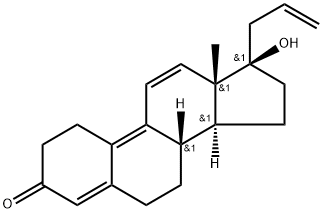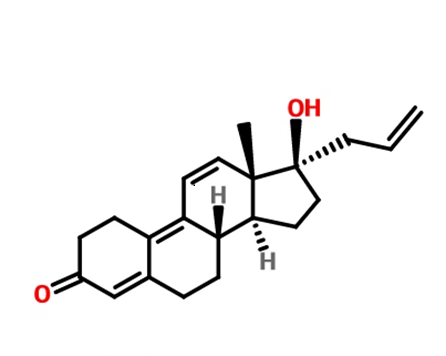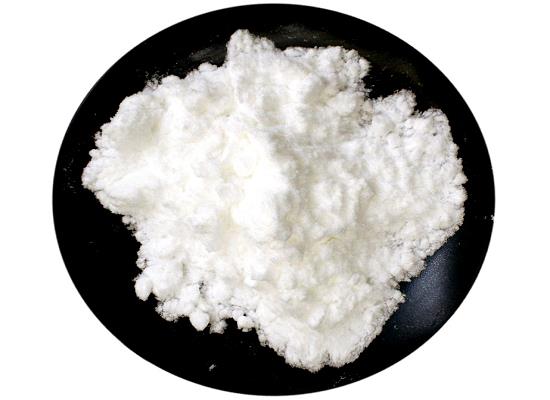Altrenogest: mechanism of action, pharmacokinetics and side effect
General Description
Altrenogest is a synthetic progestin hormone used in veterinary medicine to control the reproductive cycle of female animals. It works by inhibiting the secretion of gonadotropin-releasing hormone (GnRH), which suppresses the release of luteinizing hormone (LH) and prevents ovulation. Altrenogest also stabilizes the uterine lining and improves breeding success. In pigs, common side effects include reduced appetite, weight loss, diarrhea, aggressiveness, restlessness, hormonal imbalances, and irregular estrus cycles. Proper dosage and monitoring are important for safe use. Altrenogest has different pharmacokinetic parameters in gilts and horses.
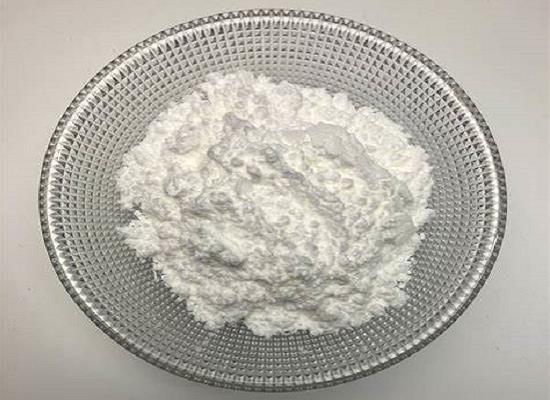
Figure 1. Altrenogest
Mechanism of action
Altrenogest is a synthetic progestin hormone that has been widely used in veterinary medicine. It exerts its effects through binding to progesterone receptors, resulting in the suppression of estrus cycle or synchronization of estrus in female animals. The primary mechanism of action of Altrenogest lies in its ability to inhibit the secretion of gonadotropin-releasing hormone from the hypothalamus. By doing so, it suppresses the release of luteinizing hormone from the pituitary gland, which in turn prevents ovulation. This inhibition of GnRH and LH secretion creates a state of anestrus or temporary infertility in the treated animal. Altrenogest also has the ability to stabilize the uterine lining, preventing its premature shedding and thus improving the chances of successful implantation of a fertilized egg. This makes it particularly useful in reproductive management programs for breeding animals. In summary, Altrenogest acts by inhibiting GnRH and LH secretion, leading to the suppression of the estrus cycle and synchronization of estrus. It also stabilizes the uterine lining and affects various aspects of reproductive function, ultimately improving breeding success in animals. 1
Pharmacokinetics
Altrenogest, a synthetic progestogen, is used for estrus synchronization in mares, ewes, sows, and gilts. In a study on gilts, 18 oral doses of 20 mg altrenogest/gilt/day were administered at 24-hour intervals. The pharmacokinetic parameters were determined using plasma samples and analyzed using WinNonlin 6.4 software. It was observed that after the first administration (D 1), the pharmacokinetic parameters such as Tmax, Cmax, and T1/2λz were similar to those after the final administration (D 18). However, the mean residence time was significantly lower at D 1 compared to D 18. Overall, the steady-state plasma concentration (Css), degree fluctuation (DF), accumulation factor (Rac), and area under the plasma concentration-time curve (AUCss) were 22.69 ± 6.15 ng/ml, 270.64 ± 42.51%, 1.53 ± 0.23, and 544.63 ± 147.49 ng hr/ml, respectively. These findings indicated that altrenogest plasma concentrations in gilts fluctuated to some extent during the 18-day administration period, without significant accumulations. In horses, altrenogest is approved for controlling oestrus but is considered a controlled drug due to its potential anabolic effects and suppression of male behavior. In a study on horses, five oral doses of 44 μg/kg altrenogest were administered at 24-hour intervals. Plasma levels reached maximum concentrations of 23-75 ng/mL, and baseline values were achieved within 3 days after the last administration. Urine peak concentrations ranged from 823 to 3895 ng/mL, and altrenogest concentrations fell below the limit of detection (approximately 2 ng/mL) after 12 days. 2,3
Side effect
Altrenogest is a synthetic hormone commonly used in pig breeding to control the reproductive cycle of sows. While it has several benefits in enhancing reproductive efficiency, there are potential side effects associated with its use. The most common adverse effects include gastrointestinal disturbances such as reduced appetite, weight loss, and diarrhea. Additionally, Altrenogest may cause behavioral changes in sows, including aggressiveness and restlessness. It is also important to note that prolonged use or high doses of Altrenogest can lead to hormonal imbalances and irregular estrus cycles in sows. Proper dosage, administration, and monitoring are essential to minimize these potential side effects and ensure safe and effective use of Altrenogest in pig production. 4
Reference
1. Wang Z, Liu BS, Wang XY, Wei QH, Tian H, Wang LQ. Effects of altrenogest on reproductive performance of gilts and sows: A meta-analysis. Anim Reprod Sci. 2018;197:10-21.
2. Xiao H, Sun P, Sun F, et al. Pharmacokinetics of altrenogest in gilts. J Vet Pharmacol Ther. 2019;42(6):660-664.
3. Machnik M, Hegger I, Kietzmann M, Thevis M, Guddat S, Schänzer W. Pharmacokinetics of altrenogest in horses. J Vet Pharmacol Ther. 2007;30(1):86-90.
4. Kaps M, Lutzer A, Gautier C, Nagel C, Aurich J, Aurich C. Altrenogest treatment reduces the stress response of three-year-old warmblood mares during their initial equestrian training. Domest Anim Endocrinol. 2022;80:106728.
Related articles And Qustion
See also
Lastest Price from Altrenogest manufacturers
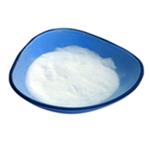
US $750.00/g2025-11-24
- CAS:
- Min. Order:
- 100g
- Purity:
- 99
- Supply Ability:
- 999

US $750.00-6500.00/G2025-07-04
- CAS:
- 850-52-2
- Min. Order:
- 100G
- Purity:
- 99
- Supply Ability:
- 9999
